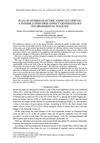Identificador persistente para citar o vincular este elemento:
https://accedacris.ulpgc.es/jspui/handle/10553/69993
| Título: | Plug-in hybrid electric vehicles (PHEVs): a possible perverse effect generated by environmental policies | Autores/as: | Ramírez Sánchez, Pedro Pablo Ndiaye, Alassane Ballé Rendeiro Martin-Cejas, Roberto |
Clasificación UNESCO: | 531212 Transportes y comunicaciones | Palabras clave: | Air Quality Environmental Policy Internal Combustion Vehicles (Ic) Plug-In Hybrid Electric Vehicles (Phevs) Automóviles híbridos, et al. |
Fecha de publicación: | 2019 | Publicación seriada: | International journal of transport development and integration | Resumen: | The automotive industry is one of the largest polluters, affecting air quality in urban areas. For this reason, the effect of the public policies on the sector is very important in economic and social terms. In this sense, one of the policies has been the subsidies for efficient vehicles where the plug-in hybrid electric vehicles (PHEVs) are included. Subsidies are very important for some of these vehicles, with a real price which is not competitive in comparison with internal combustion (IC) cars. As an example, the sales have dropped in Denmark in 2016 after the incentive reduction. However, in some cases, policies designed to regulate the situation can create some perverse effects due to the complexity of this issue. This type of vehicle is powered by an IC engine in combination with one or more electric motors using energy stored in battery packs. The real efficiency of this kind of vehicle depends strongly on the responsibility of the owner. Only if the car has been plugged in, their batteries have been fully charged and also the car is driven under “efficient mode”, the emissions will reduce significantly. Considering the fuel consumption gap between manufacturer declaration and real drive test and the emissions in different pollutants of the PHEVs in comparison with IC cars, the aim of this article is to show a new possible perverse effect generated by them. This has happened recently with diesel cars, favoured by policies focused in CO2 emission, generating NOx high level in the urban area air quality. Finally, we highlight the main result and conclude emission cost implemented in fuel tax as ‘the first best’ in environmental policies. | URI: | https://accedacris.ulpgc.es/handle/10553/69993 | ISSN: | 2058-8305 | DOI: | 10.2495/TDI-V3-N3-259-270 | Fuente: | International journal of transport development and integration [ISSN 2058-8305], v. 3 (3), p. 259-270 |
| Colección: | Artículos |
Citas SCOPUSTM
9
actualizado el 08-jun-2025
Visitas
77
actualizado el 10-ene-2026
Descargas
97
actualizado el 10-ene-2026
Google ScholarTM
Verifica
Altmetric
Comparte
Exporta metadatos
Los elementos en ULPGC accedaCRIS están protegidos por derechos de autor con todos los derechos reservados, a menos que se indique lo contrario.
